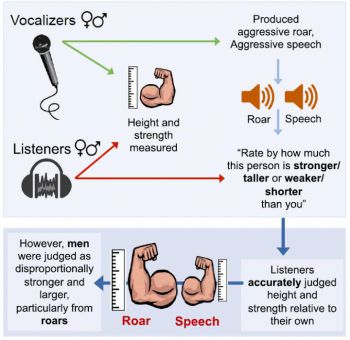Humans can judge someone’s height and strength by the sound of their ‘roar’
By: Lynsey Ford
Last updated: Thursday, 12 July 2018

This infographic shows the findings of Raine et al., who measured the strength and height of men and women (speakers and listeners). (Credit Raine et al./iScience)
Humans can determine whether another person is taller or stronger than them by the sound of their ‘roar’, psychologists from the University of Sussex reveal for the first time.
Animals including sea lions, red deer and dogs use aggressive vocalisations to judge one another’s size and threat potential when competing for resources. In a first-of-its-kind study, researchers have shown that it’s likely that our ancestors did the same thing.
The team, based in Professor David Reby’s Vocal Communication Lab at the University of Sussex, measured the upper-body strength and height of 31 men and 30 women and recorded them producing aggressive roars and speech sentences. In two separate playback experiments, they asked listeners to judge whether the vocaliser they heard was stronger/weaker, or taller/shorter than them.
Surprisingly, when judging roars, male listeners almost always accurately identified vocalisers who were substantially stronger than themselves (in 88 percent of trials). Although listeners could accurately judge strength from both roars and aggressive speech sentences, they perceived males as stronger when rating roars than when rating aggressive speech produced by the same person.
Jordan Raine, from the University of Sussex, says: “For the first time, we have shown that people can judge whether someone is stronger or weaker than them just by listening to their ‘roar’.
“Humans are unique in being able to express complex concepts and emotions with speech, but we still produce a wide range of nonverbal vocalisations and our research suggests these sounds communicate information in a similar way to other mammals."
The team also discovered that women tended to overestimate men’s strength. When a male vocaliser was of similar strength or weaker than a female listener, women tended to rate the man as stronger. They believe this finding is in keeping with a general tendency for women to underestimate and men to overestimate their abilities.
Co-researcher Dr Kasia Pisanski, also from the University of Sussex, adds: “When animals produce vocalisations, they’re communicating information about themselves, be it their physical condition or their internal state. While, as our study shows, vocalisations can serve to exaggerate traits such as physical formidability, the signal remains at least partly honest."
Raine adds: “So, when you next hear a roar in a 'Game of Thrones' battle scene, remember that it’s more than just a noise — it is both a window into that person’s physical characteristics and a social tool to influence those within earshot.”
The study, entitled 'Human listeners can accurately judge formidability relative to self from aggressive roars and speech', has been published in iScience.
The research was supported by the University of Sussex, the European Commission and the Polish Ministry of Science and Higher Education.
